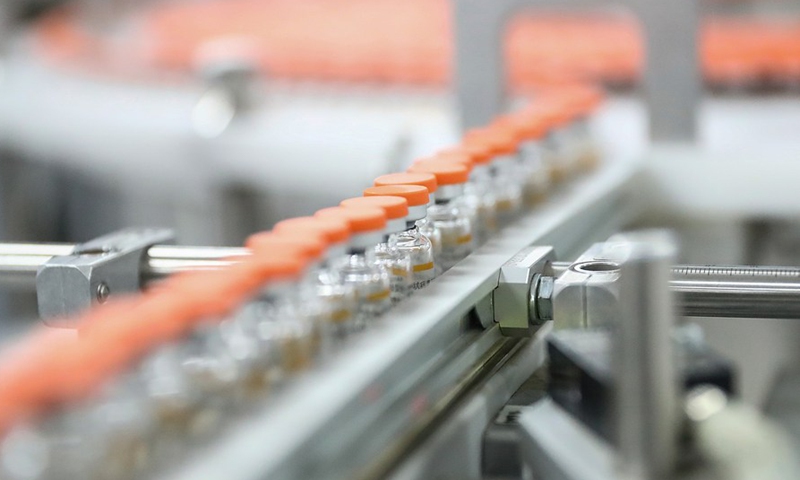 Photo taken on Jan. 6, 2021 shows COVID-19 vaccines at a packaging plant of Sinovac Research and Development Co., Ltd. in Beijing, capital of China. (Xinhua/Zhang Yuwei)
Photo taken on Jan. 6, 2021 shows COVID-19 vaccines at a packaging plant of Sinovac Research and Development Co., Ltd. in Beijing, capital of China. (Xinhua/Zhang Yuwei)
Brazil has begun its COVID-19 vaccine rollout on Sunday with doses developed by Chinese producer Sinovac, soon after the regulatory approval for its emergency use, bringing relief amid a surge in cases.
Sinovac's vaccine, known as CoronaVac, is the only one available so far in Brazil due to a delay in the shipment of the other approved vaccine developed by AstraZeneca.
As some EU countries struggle with the stagnated rollout of COVID-19 vaccines because of delayed shipment of the Pfizer-BioNTech vaccine, more countries holding Chinese-developed vaccines ramp up mass inoculations given China's a stable and orderly supply of shots.
Chinese vaccines, with its stable manufacturing capability and easier transportation, secured doses for global buyers and fulfilled the Chinese government's pledge of "making vaccine a public good," said observers, stressing that Chinese-developed vaccines are increasingly a popular choice for many who scramble for life-saving resources from "vaccine nationalist" countries hoarding enough doses to vaccinate entire populations several times.
Canada, for example, has ordered enough vaccines to protect each Canadian five times. Also, US President Donald Trump in December signed an executive order to prioritize Americans for a vaccine ahead of US assistance to other countries.
China stands ready to help more countries which rely on some Western countries prioritizing only their domestic market. China has sent out COVID-19 vaccines to at least ten countries including Indonesia, Peru, Pakistan and Serbia, according to Global Times' calculations.
The Butantan Institute has secured 46 million doses of CoronaVac by April, while the institute is prepared to reprocess the vaccine on its own production lines. Some six million CoronaVac doses are ready to be sent out, Reuters reported.
The federally funded Fiocruz institute, who has sought an emergency use authorization for the AstraZeneca COVID-19 vaccine, is still waiting for a delayed shipment of the ingredient in the AstraZeneca vaccine to a Rio de Janeiro assembly line, Reuters reported.
The Health Ministry has scrambled to get 2 million doses of the AstraZeneca vaccine from India, but a Brazilian plane, scheduled to take off on Friday to India, was delayed by "international logistical problems," media reported.
The postponement came after the Indian government said it could not give a date for the export of vaccines produced in the country.
After the flight was postponed, which would fetch the two million doses, the Ministry of Health asked the Butantan Institute to deliver all 6 million doses of CoronaVac to the public, local media reported.
Sao Paulo Governor Joao Doria said Brazilian health regulator Anvisa's decision was a triumph for science. Doria's remarks were widely seen as an insinuation against Brazil's president Jair Bolsonaro, who is seen by observers to have touted vaccines only developed by Western countries but politicized and demonized Chinese vaccines.
Some EU countries increasingly decry the short notice of late doses, while others are receiving fewer than expected doses.
Six EU countries described the delay as unacceptable and said it impacted the credibility of the vaccination process. Yet about one-third of the 27 EU governments cited "insufficient" doses at a video conference of health ministers on Wednesday, Reuters reported.
Six EU governments asked the European Commission to pressure Pfizer-BioNTech "to ensure stability and transparency of timely (vaccine) deliveries."
Under the premise that the quality and supply speed of vaccines by some Western producers were questioned, more and more countries started to seek alternative providers and turn to China.
Hungary, an EU member, is seeking emergency domestic approval for the Chinese coronavirus vaccine rather than wait for a review by the EU's European Medicines Agency, according to media reports.
Hungary's government said on Thursday it has reached a deal with China's Sinopharm to buy its coronavirus vaccine.
A Japanese medical expert Masahiro Kami, a physician and head of the nonprofit Medical Governance Research Institute, told the Global Times in a previous interview that Japan should consider importing Chinese vaccines instead of only Western-made COVID-19 vaccines, as there have been safety concerns over the mRNA-based Pfizer vaccine recently following the deaths of 29 elderly Norwegian people who received it.
Chinese-developed inactivated vaccines can be stored in an ordinary refrigerator, making it easier and quicker to be shipped in pooper regions which help guarantee its accessibility compared to mRNA ones, Tao Lina, a Shanghai-based medical expert on vaccines, told the Global Times on Monday.
China is also one of the countries with the largest production capacity and the most mature techniques in inactivated vaccine R&D, which also ensures accessibility of Chinese vaccines in an orderly and efficient manner, said Tao.




